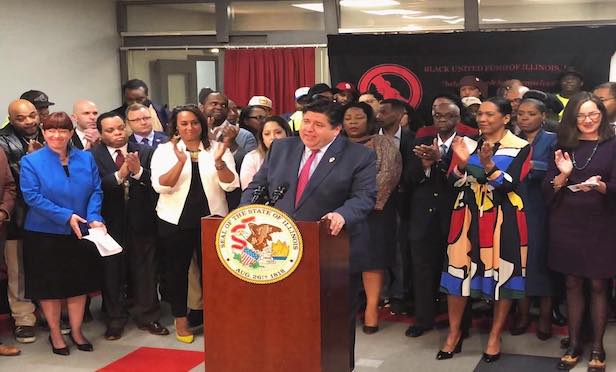 Illinois Gov. JB Pritzker and state lawmakers agreed on a framework over the weekend to legalize the adult use of cannabis in Illinois by the start of next year.
Illinois Gov. JB Pritzker and state lawmakers agreed on a framework over the weekend to legalize the adult use of cannabis in Illinois by the start of next year.
CHICAGO—Over the weekend, Illinois Gov. JB Pritzker and some state lawmakers announced they had agreed on a framework to legalize the use of cannabis by adults in the state of Illinois by Jan. 1, 2020.
The measure, if enacted, would allow adults aged 21 and over to legally purchase cannabis for recreational use from licensed dispensaries and create what the governor called as the “most equity-centric law in the country.” The proposal would dramatically expand existing laws governing medical cannabis and was expected to be introduced as an amendment to Senate Bill 7 on Monday.
“Years of work by stakeholders across Illinois means that today we are putting forward a framework for the General Assembly to move forward this session to legalize adult use cannabis, and we welcome additional feedback and insight during this debate,” said Governor Pritzker. “From the outset, I made clear that any plan for adult use cannabis had to prioritize social justice and equity, and the approach we're taking starts righting some historic wrongs and opening up access to this new market with a $20-million loan program that will help qualified applicants from impacted communities.”
Among some of the key components of the legislation include the establishment of a $20-million-low-interest loan program through the Department of Commerce and Economic Opportunity for qualified applicants to help defray the start-up costs associated with entering the licensed cannabis industry. The loan program will be paid for with existing funds from the current medical cannabis program, along with fees from licenses for existing dispensaries and cultivators that are approved in the first round of applications.
The framework establishes licenses for “social equity applicants,” who will receive points during the application scoring process. Eligibility criteria for social equity applicants includes a number of factors, such as majority ownership by residents of disproportionately impacted communities, majority ownership by those who have arrests or convictions eligible for expungement and those who have a majority of employees who have been disproportionately impacted, state officials noted.
During the licensing process, “social equity applicants” will receive 25 points out of the 200 points. Bonus points will be awarded for several categories, including for Illinois-based applicants and applicants with a labor peace agreement.
The bill places limitations on ownership to foster more diverse in the industry. The agreed-upon framework proposes ownership restrictions to prevent the consolidation of ownership in a small group and allow more business owners to participate in the new market sector. Among the requirements—no person or entity can hold an interest in more than three cultivation centers or in more than 10 dispensing organizations.
Licenses will be approved in waves, beginning with current medical cannabis license holders, followed by additional licenses being granted in 2020 and 2021.
The framework built on legislation initially put forward by Senator Heather Steans and Representative Kelly Cassidy, six working groups led by the governor's office met for the past several weeks to finalize the framework. This proposed plan lays out the governor's key priorities: legalizing the use of cannabis for adults aged 21 and older, promoting equity in ownership and participation in this emerging sector, advancing justice by expunging the records of people with minor cannabis convictions, and reinvesting funding in communities that have suffered the most from discriminatory drug policies.
“This bill stems from an inclusive process that entailed community meetings, town halls, and legislative working groups,” said Senator Steans. “In spite of having a wide variety of views, most of us wanted the same basic things – social justice, safety for our kids, and revenue for our state. I think we've done a good job of balancing these three goals.”
“Prohibition hasn't worked. Today, we're unveiling legislation that represents an important change in public policy, and it is long overdue,” said Representative Cassidy. “We wanted to create a safe, legal and comprehensive regulatory system that protects patient access and allows adults to use cannabis while keeping it out of the hands of children. We wanted to address the years, the decades of unfairness in the ways that our drug laws have been enforced. This bill represents a giant leap in the right direction.”
© Touchpoint Markets, All Rights Reserved. Request academic re-use from www.copyright.com. All other uses, submit a request to [email protected]. For more inforrmation visit Asset & Logo Licensing.







